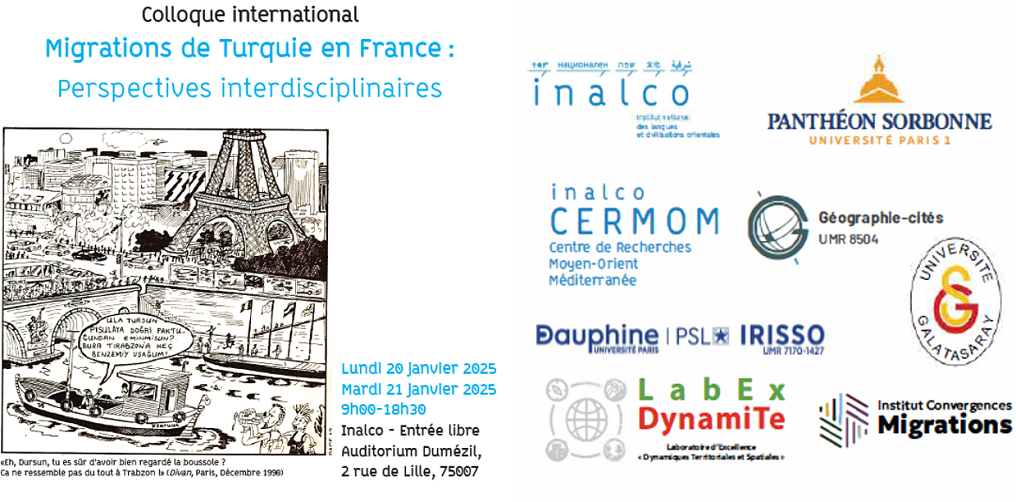LUNDI 20 JANVIER 2025
9h30 : Accueil
10h – 10h30 : Introduction
Ségolène Débarre (Université Paris 1 - Panthéon Sorbonne)
Alexandre Toumarkine (INALCO, CERMOM)
10h30 – 12h30 : Panel 1. Politiques publiques, participations politiques
Maxime Maréchal (U. Paris-Cité), Des drogmans aux interprètes ? Les interprètes en langues de Turquie à l’Ofpra, un cas sociohistorique révélateur des mutations radicales des politiques d’asile en France Merve Özkaya (IEP Grenoble) Participation politique des Franco-Turcs en France : entre influence transnationale et engagement local
Yiğit Binzet, Didem Danış (U. Galatasaray), Divisions aux urnes : Les Turcs de Strasbourg face au vote à distance.
Tamerlan Quliyev (U. Strasbourg) La migration des Azerbaïdjanais en France : la diaspora
azerbaïdjanaise entre interculturalité et relations diplomatiques
Modération et discussion : Gabrielle Angey (U. Dauphine-PSL)
12h30 – 13h30 : Déjeuner
13h30 – 15h30 : Panel 2. Lieux et territoires de l’immigration de Turquie
Nathalie Bernardie-Tahir, Greta Tommasi (U. Limoges) - Marges turques, d'hier et d'aujourd'hui. Marginalisation socio-économique et relégation spatiale en milieu rural. Le cas de Bourganeuf en Nouvelle-Aquitaine.
Ségolène Débarre, Deniz Kimyon-Tuna (UMR Géographie-Cités) - Transformation de l'offre commerciale et redéfinition des centralités de l'immigration de Turquie : le cas de la gentrification du faubourg Saint-Denis à Paris.
Théo Malçok (EHESS), Mehmet Akgün Rüzgar (Journaliste, chercheur indépendant) - Que reste-t-il de la librairie Mevlana ? Mémoires fragmentées d'un lieu de modalisation des appartenances dans le quartier de la Petite Turquie.
Armand Aupiais, Zelal Koç, Yoann Morvan (CNRS - Aix-Marseille U.) - Kurdistan(s) marseillais: Hypothèses pour l’ethnographie d’une dynamique migratoire de Turquie à Marseille.
Modération et discussion : Stéphane de Tapia (U. Strasbourg)
15h30 – 16h : Pause – café
16h – 18h30 : Panel 3. Femmes et migrations de Turquie
Salzmann Zara (Sorbonne U) - Entre Invisibilisation et Survisibilisation : Des femmes descendantes d’immigré·es originaire de Turquie à Paris et à Berlin
Invitée : Tülin Özdemir, réalisatrice, Belgique
Projection-Débat : « Les Lunes Rousses », 2019, 97 min.
Modération et discussion : Camille Schmoll, EHESS
MARDI 21 JANVIER 2025
09h – 11h : Panel 4. Mobilités, circulations, intégration
Demet Lüküslü (U. Yeditepe) Mobilité et migrations étudiantes de Turquie en France
Benoit Montabone (U. Rennes 2) Mobilités diasporiques et pratiques touristiques des Turcs de France en Turquie
Sümbül Kaya (ENTPE/EVS), Sentiment d'appartenance des Français issus des diasporas originaires de Turquie : des identifications minoritaires plurielles et imbriquées ?
Nadir Altinok (U. Lorraine) Inégalités scolaires et populations immigrées en Europe : une perspective comparative.
Modération et discussion : Samim Akgönül (U. Strasbourg)
11h – 11h30 : Pause-café
11h30 – 12h30 : Panel 5. Constructions identitaires et patrimonialisation
Kerem Görkem Arslan (U. Strasbourg) Dynamiques migratoires et héritages culturels : l’empreinte turque en Alsace
Martin Greve (Orient Institut Istanbul) Musiques de Turquie en France et en Europe : perspectives comparées.
Modération et discussion : Nicolas Elias (INALCO)
12h30 – 13h30 : Déjeuner
13h30 – 15h30 : Panel 6. Situations minoritaires
Rémi Carcélès (Aix-Marseille U) Comment peut-on être Kurde (en France et aujourd'hui) ?
Solène Lange (UPC) Identification, racisme et articulation des situations minoritaires dans les récits de personnes kurdes qui ont grandi en France.
Tony Rublon (U. Poitiers) Les pratiques transnationales des originaires de Turquie installés en France Samuel Verley (EHESS) Erwan Kerivel: un acteur français du débat intellectuel et identitaire alévi.
Modération et discussion : Olivier Grojean (U. Paris 1)
15h30 – 16h : Pause-café
16h – 16h30 Enquêter sur son histoire familiale
Restitution de travaux d’étudiants réalisés sous la direction de Sophie Hohmann (INALCO).
16h30 – 18h00 Migration en narration
Invités : Kenan Görgün, écrivain, Belgique
Mahir Güven, écrivain, France
18h00 : Mots de conclusion




 Chargement...
Chargement...